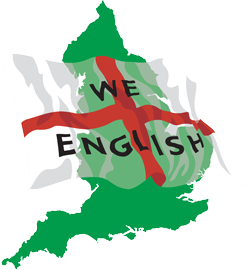“Once upon a time I lived in a double-decker bus, reg. JRR 404, better known as the Free Photographic Omnibus. She was my home, my travelling darkroom and gallery” writes Daniel Meadows on his Photobus website.
“People ask: “Where are you from?” and I have to tell them that really I don’t know. What I do know is that I’m English. And this story is about the England I come from.
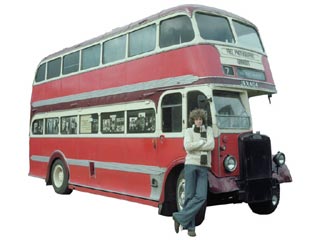
We were an unlikely couple; she with her crash gear box and temperamental ways, me with my bushy hair and homemade flares. But we got along okay and, during 1973 and ’74, we travelled about making a national portrait of the English. We covered 10,000 miles shooting pictures and giving them away. The bus’s glory days, taking holiday-makers on seaside runs to Skegness and Mablethorpe, were in the 1950s but, by the time I got to know her, she was 25 years old and (it has to be said) past her best. By comparison I — fresh out of art school and all of four years her junior — was just a whipper-snapper.”
Photographer and university lecturer Daniel Meadows is recognised as one of the prime movers in the new documentary photography movement of 1970s Britain and is best known of his tour around England in the Free Photographic Omnibus (1973-74).
In 1973 – just out of Art School – Meadows bought a double-decker bus and spent 14 months travelling through English towns. When he pulled up, he took free portraits of people who came to his bus which was fitted out as a mini-studio. In the course of a 14-month journey, he offered free portrait sessions in 22 different towns, developing the black and white prints in a darkroom he had contrived inside the bus, in which he also lived. He photographed a total of 958 people, alone or in groups, the majority of whom remained anonymous and collected their free portraits the following day.
The result was a series of photographs he called ‘National Portraits’, a selection of which you can see here-
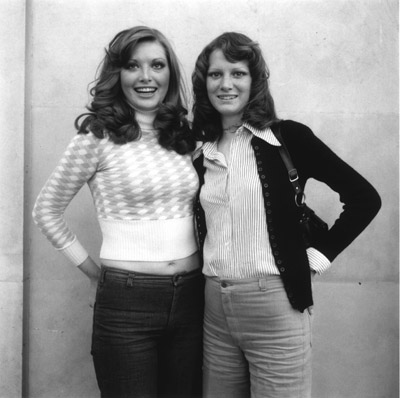
Lyn & Stella Brasher, Sisters, Southampton © Daniel Meadows, 1974

© Daniel Meadows, 1974
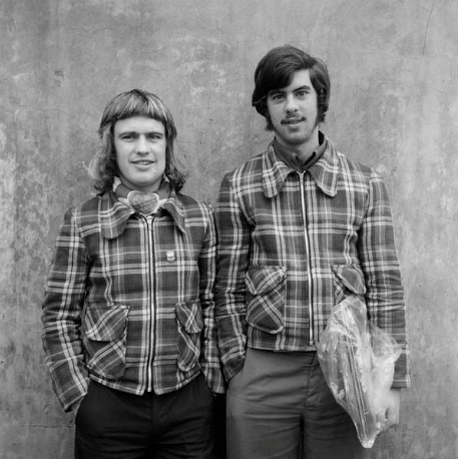
© Daniel Meadows, 1974

© Daniel Meadows, 1974
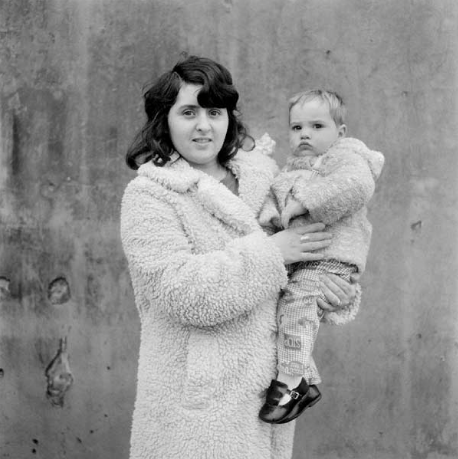
© Daniel Meadows, 1974

© Daniel Meadows, 1974

© Daniel Meadows, 1974
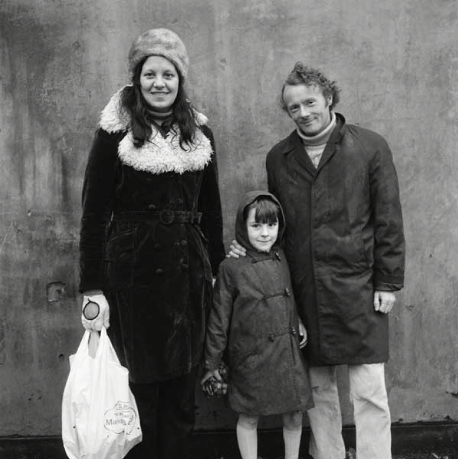
© Daniel Meadows, 1974

© Daniel Meadows, 1974
You can view a slideshow with more images from the series on Meadows’ website here.
In 1999Â Meadows decided to ‘go back’ and re-photograph some of his original ‘subjects’. He ‘found’ them by putting original photographs in local papers. The two series of portraits (from 1974 and 1999) were then published alongside each other in a book called The Bus: The Free Photographic Omnibus 1973-2001 (The Harvill Press, London, 2001).
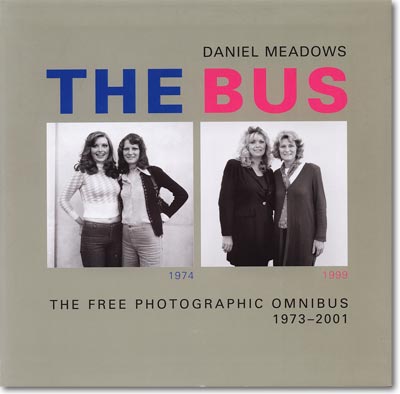
With the help of the local press in Barrow-in-Furness, Hartlepool and Southampton, he went in search of them. Many could not be found, others had died, but a number of people turned up to be re-photographed. The juxtaposition of their past and present selves makes for a unique pictorial history of the changing face of England (particularly the vagaries of fashion, and the ravages of time). Meadows interviews the sitters, ordinary people from varied walks of life, who talk candidly about their lives, their friends, their loves, their families and what they feel.
You can take multi-media tour on Meadows’ bus here.
Posted in ENGLISHNESS, OTHER STUDIES | 2 Comments »
The Archbishop of York, Dr John Sentamu, has again been talking about English national identity (see my previous post).
Speaking at the Oxford Literary Festival last week Sentamu called for a new sense of English national identity – with the help of flags, football and patriotic songs, such as 3 Lions by the comedians David Baddiel and Frank Skinner. He said the England football team and the cross of St George could play a crucial part in solving the nation’s identity crisis by uniting people of all races and ages. He also floated the possibility that St George’s Day should become a bank holiday.
Concluding his Oxford lecture, Sentamu said: “Englishness is back on the agenda. One of the consequences of attacks by so-called home grown terrorists has been to ask the question of what it means to be English? Can there be a narrative, an identity we can all share, flexible enough to recognise the new aspects of England whilst remaining authentic enough to proudly name and recognise its own history?
“Where there is no awareness of identity, there is a vacuum to be filled. Dissatisfaction with one’s heritage creates an opening for extremist ideologies. Whether it be the terror of salafi jihadism or the insidious institutional racism of the British National Party, there are those who stand ready to fill the vacuum with a sanitised identity and twisted vision if the silent majority hold back from forging a new identity.”
You can read more about his speech in The Observer here.
Posted in ENGLISHNESS | Comments Off on ARCHBISHOP OF YORK WAVES FLAG FOR ENGLAND
On Monday night, Panorama looked at the issue of Britishness in a program called True Brits. Unfortunately I missed it, but here is the background information on the program, taken from the Panorama website.
“In June this year, Liam Byrne, home office minister for borders and immigration, mooted the idea that the August bank holiday be made Britishness Day – a day of national celebration of our country along the lines of America’s 4 July holiday. His suggestion was instantly dubbed a “blunder” by the Scottish National Party, which was quick to point out that the August bank holiday is at the start of the month in Scotland, while in England and Wales it is at the end.
But even if this scheduling glitch could be overcome, huge questions still remain about how Britishness should be defined. So, on the very day which Mr Byrne suggested should be Britishness Day, Panorama: True Brits tries to answer the question what exactly is Britishness? And just as importantly, why is the government suddenly talking about it? However, as Panorama reporter Vivian White soon finds, virtually everyone seems to have a different definition of what Britishness is – that is if they are able to come up with one at all.
‘Loss of freedoms’
Prime Minister Gordon Brown – who revealed this month that he is preparing to write a book on what it means to be British – has said that it is all about shared values:Â “We share the same values about liberty, about democracy, about the need for social cohesion and for people to work together co-operatively,” Mr Brown said.
People tell Panorama what they think symbolises Britishness. But fashion designer Vivienne Westwood, who in the 1970s used satirical images of the Queen when creating her iconoclastic punk styles, tells the programme that those values and freedoms are disappearing fast, and that the government is leading the way in dismantling them.
British National Party (BNP) chairman Nick Griffin says being British is about being of British stock, in other words white. But in recent decades the ethnic makeup of Britain has been transformed by mass migration.
Governments both past and present called on people to celebrate their differences and called it “multiculturalism”. In July 2005 projecting that rainbow world identity helped us to win the prize of hosting the 2012 Olympics.
But the very next day a few British citizens made it clear their loyalties lay elsewhere by mounting the 7 July suicide bomb attacks on the London transport system, forcing Britishness and a debate about what it means be British top of the agenda.
Radical view
However, as True Brits reports, when the government poses the question “are you really one of us?” the answer is often not a simple Yes or No. Mozzam Begg, a British-born radical Muslim, is best known for having spent two years in Guantanamo Bay, only to be finally released without charge. When being held by at the US detention facility his American guards were in no doubt as to his Britishness – referring to him by the name Great Britain and even making sure that he was kept informed when the Queen Mother died. He however, is not so sure, telling the programme that he does not “think anybody knows actually what Britishness is including the people who want to tell us what they think Britishness is”.
And north Yorkshire schoolboy Cameron agrees. He believes the government are asking us to define Britishness for them because they don’t know what it is and need our help.
When asked whether “being British is more important to my sense of identify than my family’s country of origin” 43% of young people from ethnic minorities disagreed as opposed to 29% of their white counterparts. In other words young people from ethnic minorities are more likely to plump for their family’s country of origin as their marker of identity than young white people.
Rite of passage
And they are not alone – as the programme reports, in 1974 when forced to pick only one national identity, 31% of people in Scotland said that they were British, but by 2006 this figure had fallen to 14%. In 2005 the government introduced new procedures for foreigners wanting to become British citizens whereby applicants have to read a book called Life in the UK and sit a 45-minute test on society, history and culture before taking part in a ceremony marking their change of nationality.
The programme asks if this kind of education about Britishness and ceremony should be extended to young people turning 18, to mark their graduation to full status as a True Brit. One of the teenagers Vivian speaks to says that the government should not be asking what is Britishness is at all because a British citizen will be different everywhere you look.
Perhaps this in itself is something to celebrate. But, as the programme reports, even if we could agree on what to celebrate we are unlikely to agree on how to – after all isn’t all of that Union Jack waving stuff frankly rather un-British?”
Â
Here are some viewers comments about the program.
Â
Posted in ENGLISHNESS | Comments Off on TRUE BRITS – PANORAMA
In a recent post, Jennifer Hodgson, a commentator on English culture, observed what she considered to be the anachronistic nature of this project. She thought that the events I had chosen to photograph, and the components that constituted them, were archetypally English, drawing on nostalgic visual codes and serving to underline an imagined view of England, one that was not necessarily rooted in contemporary reality. This raises many interesting questions.Â
Firstly, perhaps there is the presumption that any attempt to record Englishness is part of an attempt to re-construct it or re-define it, as opposed simply to recording what one finds. In other words, I don’t have an agenda, as Tony Ray-Jones did, for example, when he set out in the late 1960s to record the English way of life before it became more Americanised.Â
Indeed, a selection of the ideas for this project have come from my website, where people have posted up their suggestions of events for me to photograph. This is important, as the photographs reflect a generalized, hopefully widespread visualization of England, not just my own vision. These events do, however, reflect people’s conception of and notion of Englishness. Many of them are traditional fetes, fairs, races and sports activities, which can appear rather mundane, or unimaginative; English life at its most predictable and stereotypical. But this is not a kind of unconscious national attempt to consolidate a frail notion of English identity. It is, I believe, a simple reflection of local life for the majority of people.Â
On the whole, people are doing what they have always done; they congregate in open spaces, on the beach or beside lakes and rivers, they eat food and drink and spend time with friends and family. They play sport and listen to music; they really do converge on the village green or the nearest playing field. Seen from this perspective, we may appear, as a nation, to lack diversity in terms of how we express our preferences and interests. Additionally, there are a number of traditional English elements to an event, for example, Punch and Judy shows or Morris Dancing that are enjoying a revival. The current enthusiasm for fetes, fairs and festivals is a reflection of changing fashions and such events are definitely in vogue once again.
This is my personal, grass roots experience. There is no doubt, however, that county councils and large organizations are utilising traditional ideas and references to market their events. This is a point that I want discuss in more detail in a later post, however, I just want to highlight one such example now. In many ways the Gloucestershire cheese rolling festival could be seen as an extreme example of Englishness being bottled and branded, with television coverage, a press compound and a £300 fee just for a photographer like me to record the event. I chose not to do so because I felt uneasy with the cynical self-consciousness on the part of the organizers to present the world with what they believed was typical Englishness (or maybe the event has just become a victim of its on success). Clearly, the cheese rolling has become a media circus and bares very little relation to ‘normal’ life.
Â
Posted in ENGLISHNESS, EVENTS & PASTIMES | Comments Off on AN ANACHRONISTIC APPROACH?
This was a question posed by Dr John Sentamu in a speech he made before his enthronement as Archbishop of York in November 2005. He answered-
“It is a very serious question. The English are somehow embarrassed about some of the good things they have done. Multiculturalism has seemed to imply, wrongly for me, ‘Let other cultures be allowed to express themselves but do not let the majority culture at all tell us its glories, its struggles, its joys, its pains’. A failure to rediscover English culture would fuel greater political extremism.”
You can read the full speech here.
Â
Posted in ENGLISHNESS | Comments Off on WHAT IS IT TO BE ENGLISH?
So far during our journey St. George is definitely winning the popularity stakes. However, entering Cheshire yesterday, the reverse seems to be true. The citizens of this leafy (and wealthy) county are flying the Union Jack with pride, especially in the village of Audlem where the flag appeared to be flying outside every other house.
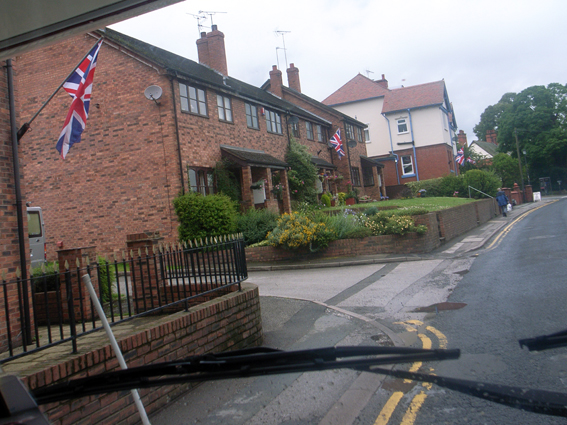
Â
It’s even flying above my head as I write this post from our campsite outside Nether Alderley. (Please no wisecracks about my ability at parking! It was the only pitch left on the site).
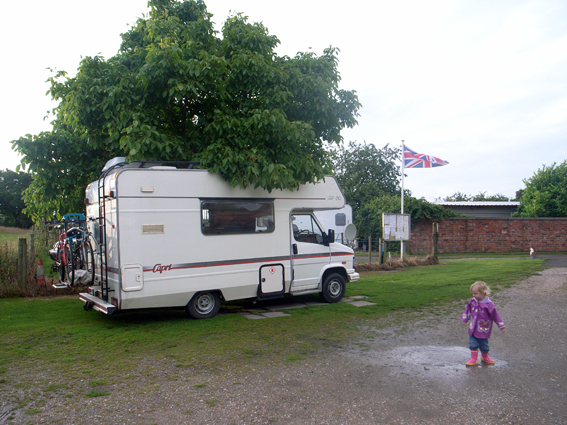
Â
The same cannot be said for Cheshire residents David and Ellen Stephenson who have flown a St. George’s flag at their home in Rochester Crescent, Crewe for more than eight years. The couple were featured on page 2 of yesterday’s Crewe Chronicle under the headline “National Pride? You’ll need to get permission for that…â€
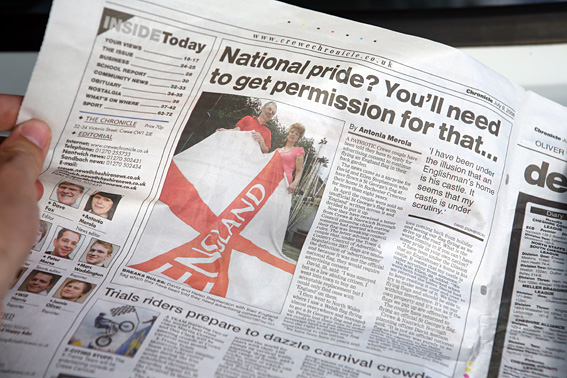
Â
As Chronicle journalist Antonia Merola writes, “A patriotic Crewe couple have been told have have to apply for advertising consent to continue flying an England flag in their back garden.
In April the couple were sold an unofficial St. George’s flag with ‘England’ written across it and decided to put it up.Â
The couple have now received a letter from Crewe & Nantwich Borough Council planning chiefs stating someone had queried whether their flag was breaking council rules. The letter advise them that, under the Town & Country Advertising Regulations 2007, flags are under the definition of ‘advertisement’ and because it was not the official national flag, they would require advertising consent.
David, 59, said: ‘We have been here 23 years and love coming back from holiday and seeing our flag flying as we drive up the road. What is the world coming to if you can’t have some price in your own nation?’
The couple have returned to flying an official St. George’s flag.”
Â
Posted in ENGLISHNESS | Comments Off on FLYING THE FLAG- ST.GEORGE vs UNION JACK
Here are a few quotes I’ve come across in my research over past few weeks, which I’ve found particularly interesting or inspirational. If you have any other suggestions, please post them below.
“Happy are those who see beauty in modest spots where others see nothing. Everything is beautiful, the whole secret lies in knowing how to interpret.â€Â
Pissarro (1893). Quoted in Britain Observed by Geoffrey Grigson (1975)
“My limited and abstracted art is to be found under every hedge, and in every lane, and therefore nobody thinks it worth picking up.â€Â
Constable (1832) on declaring he had never seen an ugly thing in his life. Quoted in Britain Observed by Geoffrey Grigson (1975)
“It is part of the photographer’s job to see more intensely than most people do. He must have and keep in him something of the receptiveness of the child who looks at the world for the first time or of the traveller who enters a strange country.â€Â
Bill Brandt (1948)
“One of the pleasures of being English is to return to this country after a longish time abroad, especially if you come up the Solent in a liner….soon familiarity blinds you again, but for an hour ot two you have caught a surprising vision of your country and your countrymen: you have notice a hundred details which are peculiar to England; you have, in fact been able to look through foreign eyes.â€Â
Raymond Mortimer from the introduction to Bill Brandt’s The English at Home (1936)
 “England has a much softer atmosphere. Colours just don’t sing the way they do in the States…When I got back to England I found everything so grey that I didn’t see any point in shooting in colour. It didn’t seem to be an important part of our lives….To me Britian is very much a black and white country…â€Â
Tony Ray-Jones from an interview in SLR Camera (1969)
 “We must live in a country and work there in order to understand its ways and customs – to travel through as a tourist is to see only clichés.â€Â
Tony Ray-Jones, Notes on Jean Renoir (c.1967)
 “One can learn a good deal about the spirit of England from the comic coloured postcards that you see in the windows of cheap stationers’ shops. These things are a sort of diary upon which the English people have unconsciously recorded themselves. Their old-fashioned outlook, their graded snobberies, their mixture of bawdiness and hypocrisy, their extreme gentleness, their deeply moral attitude to life, are all mirrored there.â€Â
George Orwell, The Lion and the Unicorn (1941)
“Englishness is continuous, it stretches into the future and the past, there is something in it that persists; as in a living creature. What can the England of 1940 have in common with the England of 1840? But then, what have you in common with the child of five whose photograph your mother keeps on the mantelpiece? Nothing, except that you happen to be the same person.â€Â
George Orwell, The Lion and the Unicorn (1941)
 “England is not at all a single category but a set of relationships. The nation exists in tension. Its fellow members remain deeply divided among themselves, but at the same time they constantly prove themselves ready to unite around certain issues, talismans and images.â€Â
John Taylor, A Dream of England (1994)
“The English have not devoted a lot of energy discussing who they are. It is a mark of self-confidence: the English have not spent a great deal of time defining themselves because they haven’t needed to.â€Â Â
Jeremy Paxman, The English (1999)
“In a society of individuals, loyalties are to kindred spirits. Instead of easy-going, random meetings of street life, the English do their socialising by choice and form clubs – ‘Who runs the country?’ asked John Betjeman rhetorically. ‘The RSPB. Their members are behind every hedge.’ And he was speaking long before the RSPB membership reached its present vertiginous levels of well over one million. There are clubs to going fishing, support football teams, play cards, arrange flowers, race pigeons, make jam, ride bicycles, watch birds, even for going on holiday.â€Â
Jeremy Paxman, The English (1999)
“I hope that this apparently incongruous series of images will communicate something of the mixture of anxiety and apprehension, sadness and affection with which I view the current state of our nation.â€Â
Paul Graham from the introduction to Britain in 1984 co-published by the National Media Museum and The Photographers’ Gallery (1984)
Posted in ENGLISHNESS, INSPIRATION, RESEARCH | 1 Comment »
Today I was photographing at the Cotswold Water Park, a 40 square mile wetland area south of Cirencester. The Water Park is the catchment area of the Upper Thames. Back in 1967, it was designated the Cotswold Water Park by a Joint Committee formed from the four local authorities – Gloucestershire & Wiltshire County Councils, and Cotswold & North Wilts District Councils. Many of the lakes are flooded gravel excavation pits. Gravel extraction began in the area over 50 years ago. Because the water table is so high, the first quarries were dug wet; today, however, quarries are de-watered. When extraction is complete, all pumps are switched off and the holes fill naturally with water. There are 140 lakes in the park, controlled by 40 different owners, many of whom use their lakes almost entirely as private property, private clubs or for private developments.
I spent most of the day photographing at the Keynes Country Park with its large beach area and lush green wooded backdrop. The lake was packed with families and groups of friends enjoying the May sunshine. The scene reminded me of a photograph I’d taken in Yekaterinburg for my book on Russia, Motherland (also taken in May).

Victory Day Picnic, Yekaterinburg, May 2005
Interestingly enough, having photographed a family barbequeing on the edge of the woodland, I discovered they were actually from Slovakia. Dusen and his wife have lived in Stroud for the past three years where they work as vets. When I asked them about their future plans they told me they’d be returning to Slovakia because they wanted to bring up their children in their ‘homeland’. This sense of belonging echoed the relationship that many Russian’s feel for their ‘motherland’ or rodina in Russian.
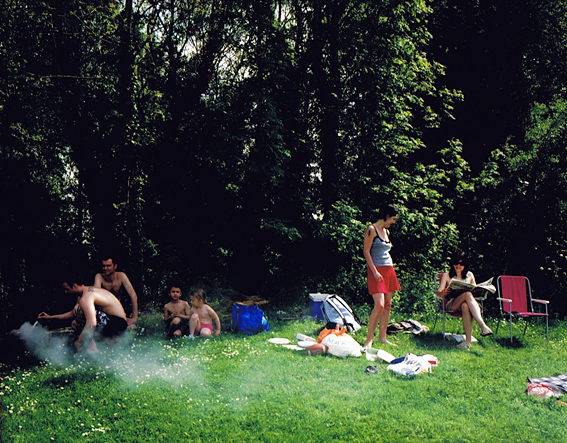
Dusen and his family, Keynes Country Park
Rosamund Bartlett, who wrote the introduction to my book, described the idea of the rodina as such-
“Rodina might just about be the most emotive word in the Russian language. The fact that it is also impossible to translate adequately says something about its close relationship to questions of national destiny, the Russian sense of self and the enduring belief in the country’s messianic future. The Russian motherland is something apart. ‘Every nation has a motherland,’ wrote the religious philosopher Georgy Fedotov in 1915, ‘but only we have Russia.’ The deepest source of patriotism in Russia accordingly lies not in pride in national achievements or military glory, but in love for the motherland, whose most visible expression is the extraordinary, almost physical attachment which Russians have for their native landscape – an attachment which they are often at a loss to fathom.”
This sense of belonging and attachment to a physical place is one of the motivations for my England journey. I suppose in some ways I’m on a quest to discover what my own homeland means to me.
Posted in ENGLISHNESS, ON THE JOB | Comments Off on HOMELAND
It seems that the PR company charged with promoting the new edition of the Rough Guide to England have been peddling the headline grabbing quote “The English are overweight, binge-drinking reality TV addicts.†It’s certainly been successful given the amount of news coverage it’s got in the past 48 hours.
Apparently the Rough Guide accuses the English of being quarrelsome, contradictory and “obsessed with toffs and C-list celebritiesâ€Â and labelling English people as “insular, self-important and irritating”. It goes on to say that political debate on issues such as immigration, Islamic terrorism and street crime is “served up with liberal dollops of celebrity chit-chat. Even the world’s most remote communities are on first-name terms with its princes, footballers and pop stars.”
However, the guide also pays the country some veiled compliments. For example, England is “a country of animal-loving, tea-drinking, charity donors, where queuing remains a national pastime and bastions of civilisation, like Radio 4, are jealously protectedâ€. They conclude that “Of the 200-plus destinations across the world that Rough Guides covers, there is none so fascinating, beautiful and culturally diverse, yet as insular, self-important and irritating, as England.â€
According to The Independent, the guide offers some less-than-complimentary opinions on some of the country’s towns and cities. It describes Blackpool, arguably one of Britain’s premiere seaside resorts, as “shamelessly brash”. Derby is “unexciting”, Plymouth is “bland” and, as for the English Riviera, Torquay, “St Tropez it ain’t” is The Rough Guide’s unforgiving verdict.
Â
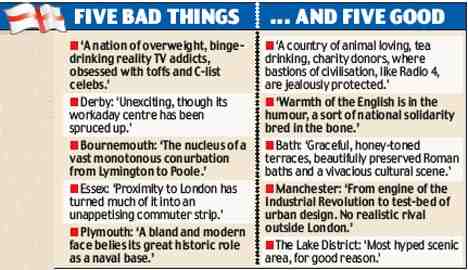
Given current suspicion towards travel guide writers, I wonder if those involved in writing this edition actually visited England!
It’s certainly got some local people riled. Here are some comments in the Gloucestershire Echo. I’ll let you know if I agree as we’re off to Gloucestershire later this week.
Posted in ENGLISHNESS | Comments Off on ROUGH GUIDE TO ENGLAND
I’ve just comes across this article by Amelia Hill in the Observer called The English identity crisis: who do you think you are? (Sunday 13 June 2004). It features some interesting quotes on the topic of Englishness-
The first quote is from Harold Roberts who considers himself to be one of England’s last true Englishmen. Now 74, he has been farming in the heart of land straddled by the Cotswolds and the Bredon and Malvern hills since he was eight years old.
“I don’t understand how anyone can feel English when they don’t have a connection with the English soil. The soil is my identity: it is as important to me as contact with living people. It is who I am, where I come from and, in the end, where I will go.”
Another quote comes from Paul Gilroy, London-born professor of Sociology and African American Studies at Yale University and author of There Ain’t No Black in the Union Jack.
“There is an anxiety about what it means to be English today that has reached a level of urgent intensity in the past five years,’ he says. ‘We are returning to a nativist interpretation of what England is, which can only lead to misery – both for incomers being bullied into adopting a version of Englishness, and for those born here, who are destined to be bitterly disappointed by eternally unmet, unrealistic expectations.”
Linda Colley, author of Captives: Britain, Empire and the World 1600-1850, argues that “Englishness is a new concept: a word that has only recently been invented. For any people to try to pin down their identity as though it is a captive butterfly is simply wrong: people are able to have more than one identity and the fact we’re returning to trying to limit ourselves to one identity is a sign of a growing insecurity and uncertainty.”
Colley believes that the recent search for Englishness is the reaction of a nation feeling squeezed out of existence by Europe on the one side, and by the devolution of power to Scotland, Wales and Northern Ireland on the other.
This is rebutted by Sir Bernard Crick, author of George Orwell: A Life and a book of political essays, Crossing Borders, who says “There is nothing to be ashamed of in trying to establish what it means to be English, any more than there is something to be ashamed of by defining what it is to be Scottish or Welsh. Englishness is something to be proud of and protected. A determination to discover what Englishness is, is a sign we are ready to become stronger as a nation. It was when we did not dare ask the question that we were weak.”
Professor Roger Scruton, philosopher and author, believes the English are facing one of the most dangerous moments in their history: “If people don’t have a social and an individual identity, they have no way of identifying with their neighbours or anyone else. That way lies social chaos, which is a potentially violent place to be.”
Sunder Katwala, general secretary of the Fabian Society, believes part of the problem is that, while Britishness has been defined and redefined over the generations, Englishness has remained untouched. “We knew what Britishness was, so it could be adopted, adapted and pluralised”, he says. ‘This is why we have British Asians but not English Asians. But far from being weakened by the lack of definition, the fact that we can’t define Englishness means we can still create it depending on what we want it to be. That very nebulousness has enabled the English to absorb new cultures and influences with fluid ease.”
Posted in ENGLISHNESS | 2 Comments »











